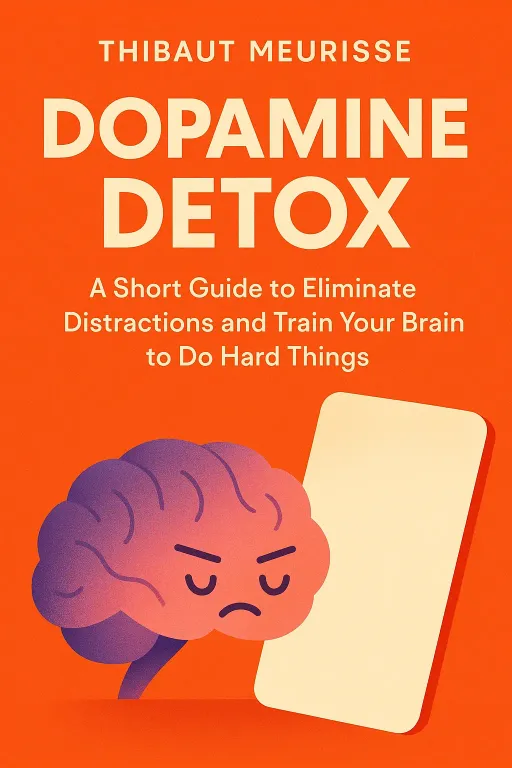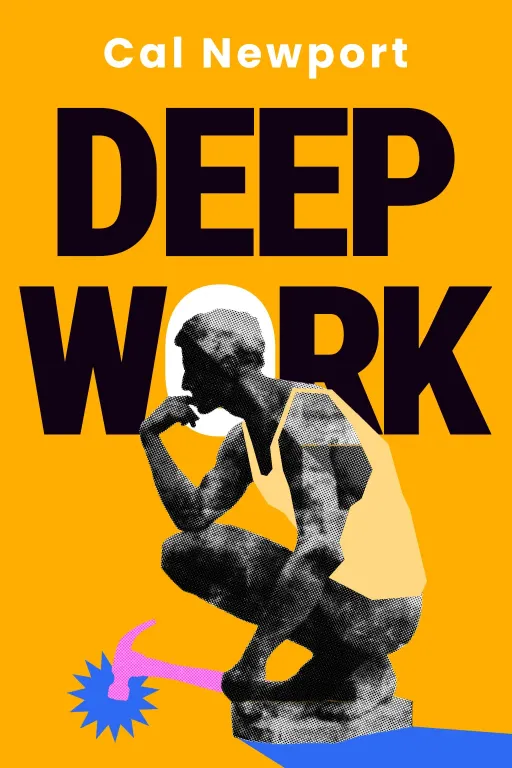
The Dopamine Paradox
9 minA SHORT GUIDE TO ELIMINATE DISTRACTIONS AND TRAIN YOUR BRAIN TO DO HARD THINGS
Golden Hook & Introduction
SECTION
Mark: The title of the book we're discussing today is, scientifically speaking, wrong. And the author admits it. But that mistake reveals a profound truth about why you can’t stop scrolling and why doing the hard things feels impossible. It’s a fascinating paradox. Michelle: Wait, what? The author admits the title is wrong? That’s a bold opening strategy. I’m intrigued and a little skeptical. What book are we talking about? Mark: We are diving into Dopamine Detox: A Short Guide to Eliminate Distractions and Train Your Brain to Do Hard Things by Thibaut Meurisse. And you’re right to be skeptical, but that’s what makes this so interesting. Meurisse is a massive name in the practical self-help space. He’s known for taking complex ideas and making them incredibly simple and actionable. Michelle: Okay, so he’s a master of simplification. And sometimes simplification can lead to… well, getting the science a little bit wrong? Mark: Exactly. The book has a mixed reception for that very reason. It's praised for being practical but criticized for being almost too simple. But in this case, the "wrong" title actually helps us understand the real problem. Michelle: Huh. Okay, so if 'dopamine detox' is the wrong term, what's the right way to think about this problem that has me checking my phone every 37 seconds?
The Hijacked Brain: Misunderstanding Dopamine in the Modern World
SECTION
Mark: The book opens with a story that I think everyone can relate to. It’s called "The Procrastinator's Morning." You wake up, you know you have that one big, important task you need to do. Maybe it’s a report for work, studying for an exam, or finally starting that project you’ve been dreaming about. Michelle: Oh, I know this story. It’s my biography. Mark: Right? But instead of starting, you think, "I'll just check my email first." Then you glance at your stock portfolio. Then you open social media for "just a minute." An hour later, you've watched a dozen videos, read three articles, and the important task now feels like climbing Mount Everest. The book describes it as an "invisible mental barrier." Michelle: That barrier is very, very visible to me. It feels like a physical wall. So what’s going on? Is my brain just flooded with dopamine? Mark: Here’s the twist, and it’s the core idea of the book. Dopamine isn't a pleasure chemical. That’s a common misconception. It's an anticipation chemical. It’s the neurotransmitter of "more." It's what drives you to seek a reward. It’s the thrill of the hunt, not the satisfaction of the catch. Michelle: That makes so much sense. It’s the feeling of "ooh, what's the next post going to be?" not the feeling of "wow, that last post was so fulfilling." Because it never is. Mark: Precisely. The book argues that our brains are not being "detoxed" from dopamine. Instead, they are being constantly overstimulated. We're training our brains to expect a high level of novelty and reward with very little effort. Checking your phone is easy and delivers a little hit of anticipation. Writing a ten-page report is hard and the reward is hours away. Michelle: So it's not that we have too much dopamine, it's that our baseline for what's 'interesting' is totally out of whack? The hard, important stuff just can't compete. Mark: You’ve got it. The gap between the low-stimulation work and the high-stimulation distraction becomes a chasm. Your brain, seeking the path of least resistance, will always choose the scroll over the struggle. The book has this fantastic line: "Remember that excitement and fulfillment aren’t the same things." Michelle: Wow. That one hits hard. We chase the excitement of the next notification, the next video, the next outrage, but we're left feeling empty. It’s a junk food diet for the mind. Mark: It is. And what’s chilling is that the people who design these systems know it. The book brings up the well-known story about Steve Jobs, who created the iPad but famously restricted how much his own children could use technology. Michelle: Right, the ultimate "don't get high on your own supply" move. When the architect of the system won't let his own family use it freely, you know something is up. Mark: It tells you everything. These platforms are engineered to hijack that dopamine-driven seeking loop. They are designed to be addictive. So the problem isn't that you lack willpower; it's that you're up against a multi-billion dollar industry dedicated to capturing your focus. Michelle: Okay, I'm sold on the problem. My brain is hijacked. I’m living in a digital Skinner box. But telling me to "just focus" is useless. What does the book actually suggest we do about it? Because if the answer is "try harder," I'm out.
The Friction & Flow Method: Designing Your Way Out of Distraction
SECTION
Mark: This is where the book, despite its scientific simplification, becomes incredibly valuable. It’s not about trying harder; it’s about being smarter. The core solution is a three-step method, but the most powerful idea is what the author calls adding "friction." Michelle: Friction? Like, making things more difficult? We spend our whole lives trying to make things easier. Mark: Exactly. We try to make the right things easier. The book’s genius is in suggesting we make the wrong things harder. It leverages our natural laziness for our own benefit. The author shares a personal story that perfectly illustrates this. He found himself wasting too much time on the internet. Michelle: A common ailment. What did he do? Install a blocker app? Mark: He did that too, but he went a step further. He physically unplugged his internet modem and locked it in a storage room in his apartment building's basement. Michelle: No way. That’s extreme. Mark: Think about it. To get online, he would have to leave his apartment, take the elevator down four floors, unlock four different doors to get to the storage room, grab the modem, come all the way back, and plug it in. The amount of effort—the friction—was so high that he would only do it if he really needed to. The mindless, impulsive browsing was completely eliminated. Michelle: That's brilliant! It's not about willpower at all, it's about architecture. You’re designing your environment to make your bad habits a total pain in the neck. I love that. Mark: It’s a game-changer. And you can apply it in smaller ways. The book suggests simple things, like instead of a to-do list on your phone, which is one tap away from Instagram, use a physical pen and paper. The act of picking it up creates a tiny bit of friction for distraction and a clear path for focus. Michelle: What about the digital world? Can we add friction there? Moving my router to the basement might get me evicted. Mark: Absolutely. This is where the book's principles can be paired with modern tools. There are apps like Freedom that let you schedule times to block the entire internet. Or a browser extension called DF Tube—for "Distraction Free Tube"—which can strip the YouTube homepage of all recommendations, comments, and autoplay videos, leaving you with only the search bar. You can go there with a purpose, find what you need, and get out without falling down a rabbit hole. Michelle: Okay, these are the kinds of practical, concrete tips I was hoping for. It’s about creating closed systems for work instead of getting lost in the open systems of the internet. Mark: You’ve nailed it. And on the flip side, you reduce friction for your good habits. If you want to go to the gym in the morning, lay out your clothes the night before. If you want to read more, leave a book on your pillow. Make the good choice the easy choice. Michelle: It’s so simple, yet so profound. It reframes the entire struggle. It’s not me versus my weak brain. It’s me, the clever architect, versus a poorly designed environment. Now, does all the advice in the book hit this hard? Mark: Not all of it. There are moments where the simplicity feels a bit shallow. For instance, one exercise just says, "Write down what your fears are." And then the chapter ends. Michelle: That’s it? Just... write them down? No follow-up? It’s like a doctor saying, "So you have a broken leg. Okay, acknowledge your broken leg." And then he just walks out of the room. Mark: Exactly. So you have to be a discerning reader. But the core idea of designing for friction is so powerful that it makes the whole book worthwhile. It’s a principle you can apply to almost any area of your life.
Synthesis & Takeaways
SECTION
Michelle: So when you put it all together, the big picture is really clear. We're told the fight for focus is a battle of willpower, a moral failing on our part. But this book, even with its quirky title, reframes it. Mark: It does. The battle isn't happening inside your head as a test of your virtue. It's happening in your environment. The modern world is meticulously designed to reduce friction for distraction because your attention is their product. Our job is to become conscious architects of our own lives and deliberately design that friction back in for the things that matter. Michelle: That’s incredibly empowering. It’s not that I'm broken or lazy; it's that I'm playing a game that's rigged. But now I know how to start changing the rules. It’s not about a 48-hour "detox" and then you're cured. It’s about building a sustainable system. Mark: A sustainable system built on small, intelligent choices. The book ends by reminding us that your focus is worth a lot of money to a lot of companies, but it's worth even more to you. It's the currency of a well-lived life. Michelle: I love that. It makes me want to start right now. What’s one thing someone listening could do today? Mark: Just pick one distraction. The one that pulls you in the most. And add one tiny piece of friction to it tonight. If it's an app, move it off your home screen into a folder on the last page. Log out of the service so you have to type your password every time. Just make it one step harder. See what happens. Michelle: That’s a great challenge. And we'd love to hear what you try! Find us on our social channels and share your best friction hacks. Let's build a library of these ideas. Mark: This is Aibrary, signing off.









